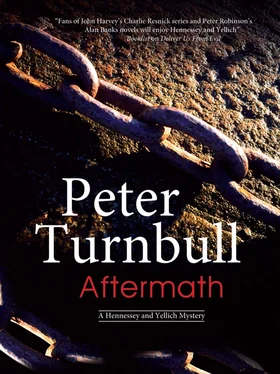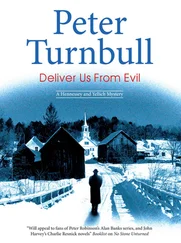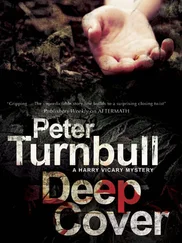Peter Turnbull - Aftermath
Здесь есть возможность читать онлайн «Peter Turnbull - Aftermath» весь текст электронной книги совершенно бесплатно (целиком полную версию без сокращений). В некоторых случаях можно слушать аудио, скачать через торрент в формате fb2 и присутствует краткое содержание. Жанр: Полицейский детектив, на английском языке. Описание произведения, (предисловие) а так же отзывы посетителей доступны на портале библиотеки ЛибКат.
- Название:Aftermath
- Автор:
- Жанр:
- Год:неизвестен
- ISBN:нет данных
- Рейтинг книги:4 / 5. Голосов: 1
-
Избранное:Добавить в избранное
- Отзывы:
-
Ваша оценка:
- 80
- 1
- 2
- 3
- 4
- 5
Aftermath: краткое содержание, описание и аннотация
Предлагаем к чтению аннотацию, описание, краткое содержание или предисловие (зависит от того, что написал сам автор книги «Aftermath»). Если вы не нашли необходимую информацию о книге — напишите в комментариях, мы постараемся отыскать её.
Aftermath — читать онлайн бесплатно полную книгу (весь текст) целиком
Ниже представлен текст книги, разбитый по страницам. Система сохранения места последней прочитанной страницы, позволяет с удобством читать онлайн бесплатно книгу «Aftermath», без необходимости каждый раз заново искать на чём Вы остановились. Поставьте закладку, и сможете в любой момент перейти на страницу, на которой закончили чтение.
Интервал:
Закладка:
‘Yes,’ Hennessey smiled, ‘so we’ll be tracing all the former staff. .’
‘Well, I wish you luck. Have you got all the photographs you need?’
Hennessey turned to the scene of crime officer who nodded. ‘Yes, sir,’ he added.
‘So we can transport the bodies to the York District. I’ll go and await them.’ She glanced at her watch. ‘I’ll commence the post-mortems tomorrow first thing, nine thirty am. Will you be observing for the police, Chief Inspector?’
‘Yes, ma’am, most probably.’
It was 16.35 hours.
TWO
Thursday 11th June — 10.05 hours — 22.22 hours
in which a home visit is made and Carmen Pharoah and George Hennessey are severally at home to the gracious reader.
The room was brilliantly illuminated by a series of filament bulbs concealed behind opaque Perspex sheets in the ceiling. The Perspex sheets successfully avoided the potentially dangerous epileptic fit inducing ‘shimmer’ and bathed the room in a bright but constant glow, which was not harmful to the eyes of those in the room. In the room, four corpses lay on four stainless steel tables arranged side by side in a row. The fifth body of the five, one of the complete skeletons, found in the kitchen garden at Bromyards remained in a steel drawer in a chilled adjacent room. ‘Four is quite sufficient to start with,’ Dr D’Acre had explained. A sombre mood, very sombre in fact, thought Hennessey, as he stood against the wall observing the procedure for the police. He had not known a mood more sombre to have previously descended on the room. He watched as Dr D’Acre moved the arms and legs of each body, sometimes having to use all her strength, until all four lay face up, arms by the side, legs straight out and close together, and thus affording each corpse, even in death, a degree of dignity. Each victim seemed to have expired in a foetal position, either because they had sat up against the wall as they had drawn their last breath, or more likely, thought Hennessey, having seen the five bodies shortly after they had been found, that they had, with resignation, turned on their sides and awaited their own death. Hennessey watched Dr D’Acre as she worked, moving in a slow but determined, and yet gentle, manner, using as little force as necessary and handling each corpse as if it was a living being, and so she managed to create a distinct sense of reverence for the deceased. Her eyes, too, when he was able to see them, he noted, displayed a look of respect for the dead. Her mouth was kept closed as she worked, her soft jawline set firm. A single act of clumsiness, Hennessey realized, a needless look of distaste for the work she performed, or a smile, no matter how brief, or a split-second gleam in her eyes, or of eye contact with him or Eric Filey, would ruin everything, because her attitude, her professionalism, was example setting. She was leading from the front, and Hennessey and Eric Filey were willing followers and responded by exhibiting the same decorum.
Having laid out the skeletons, with the occasional help of Eric Filey, Dr D’Acre turned her attention to the least decomposed of the four, and as such, clearly the most recent of the five bodies to have been brought to Bromyards.
‘The body. . oh, please give this a number and today’s date, Kate.’ Dr D’Acre spoke for the benefit of the microphone, which was attached to an angle poise that was bolted into the ceiling. ‘Kate’ was, Hennessey assumed, clearly a skilled audio-typist who knew what to write in the report and what not to write. It seemed clear that D’Acre and ‘Kate’ knew each other very well and that they worked well together. ‘The body,’ Dr D’Acre continued, ‘is in an advanced state of decomposition and is almost completely skeletonized. It is that of an adult of the female sex. There is an absence of any significant injury to the skeleton. The skull and all long bones, ribs etcetera, appear intact. There is no sign of trauma at all.’ She turned to Hennessey, ‘That is worrying in a sense.’
‘Yes, ma’am,’ Hennessey nodded. He stood as far away from the dissecting table as possible, his place to be called forward to examine or witness something of significance only if invited to do so by Dr D’Acre. He was dressed similarly to Dr D’Acre and Eric Filey in green coveralls, including hat and slippers. They were worn over underclothing and always were incinerated after a single usage.
‘Early days, yet,’ Dr D’Acre returned her attention to the corpse, ‘but the absence of peri-mortem trauma indicates a slow and a lingering death.’ Dr D’Acre took the scalpel to the stomach, still discernible, and opened it with a single linear incision. ‘Nothing in there. . there might still have been some small trace of food even after this length of time, but its complete absence could mean that she was deprived of food in the last twelve or twenty-four hours of life. . but decay is too advanced. . the kidneys, too, are too decayed to be able to determine if she was deprived of fluid during the same period.’ Dr D’Acre laid the scalpel in the stainless steel tray containing a generous amount of disinfectant. ‘I will give all due attention to the task in hand, all due address, but if this corpse is typical of those found at the location in question, then I am obliged to give you advance warning that I am unlikely to be able to determine the cause of death.’
‘Appreciate that, ma’am.’
‘It’s likely going to be asphyxiation, plastic bag over the head. . or thirst or starvation. . in lessening degrees of mercy. Asphyxiation takes a matter of minutes, thirst will take a few days. . but if the victim is allowed fluid then starvation could take weeks.’
‘We wondered about the possibility of them freezing to death?’
‘Yes, hypothermia, that is indeed a fourth possibility, which will take a short time in the depths of winter and will also leave no trace upon the skeleton. Poison is an unlikely fifth, as is drowning, but those two might and will leave traces respectively. Heavy poisons such as arsenic and cyanide will leave traces, alcohol won’t. But I will be able to tell if they were drowned. . but the absence of a body of water in the area leads me to think it unlikely.’
‘I would think so too, ma’am, the fact that they were restrained and attached to a long chain makes me think that they were alive when they were abandoned. . alive and conscious. . from a police officer’s point of view.’
‘I would be inclined to agree with you, Chief Inspector, from a forensic pathologist’s point of view,’ she tapped her forefingers lightly on the rim of the table, ‘from the perpetrator’s point of view, I would think he’d want a rapid onset of death. . he would abandon them to thirst or hypothermia. He wouldn’t return each day with a plentiful supply of water to keep them alive until they starved. . too risky. So logic, not scientific analysis, points to hypothermia or thirst as the likely cause of death, depending upon the time of year they were chained up and abandoned. But that is encroaching on your area of expertise. Sorry.’
‘Encroach all you like.’
‘Thank you, but I suppose that that is my way of apologizing for being unlikely to find a cause of death. I think my expertise, modest as it is, will be confined to doing what I can to assist in the identification of the deceased, especially since one victim had sustained a distinct head injury much earlier in her life.’
‘That’s still very, very useful, thank you.’ Hennessey then glanced at Eric Filey and repeated, ‘Thank you.’ George Hennessey had come to like Filey a great deal, and come to respect him; young, slightly rotund, not only was he clearly sufficiently good at his job that he impressed Dr D’Acre but, unlike other pathology laboratory assistants whom Hennessey had met, Filey possessed a warmth about him and approached his employment with a good-humoured attitude, although when circumstances demanded, as at that moment, he was capable of demonstrating sincere reverence.
Читать дальшеИнтервал:
Закладка:
Похожие книги на «Aftermath»
Представляем Вашему вниманию похожие книги на «Aftermath» списком для выбора. Мы отобрали схожую по названию и смыслу литературу в надежде предоставить читателям больше вариантов отыскать новые, интересные, ещё непрочитанные произведения.
Обсуждение, отзывы о книге «Aftermath» и просто собственные мнения читателей. Оставьте ваши комментарии, напишите, что Вы думаете о произведении, его смысле или главных героях. Укажите что конкретно понравилось, а что нет, и почему Вы так считаете.












